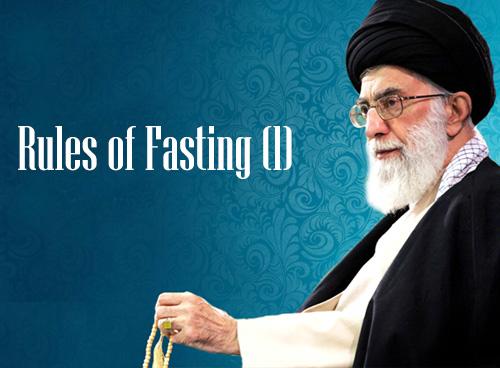What Must Be Avoided during Fasting
When a person is fasting, he should avoid a few things and if he intentionally commits any of them his fast will become void. In what follows, we shall mention these matters and give details on each one of them.
1- Eating and Drinking
If a person intentionally eats or drinks during the day, his fast will become void. He must abstain from any form of food or liquids. There is no difference if the food or liquids are edible and drinkable such as bread or water, or if they are not such as paper and dirt A person must abstain from anything which can be consumed.
There is also no difference in quantity. Even a single drop of water or a grain of wheat invalidates the fast.
We must also point out that eating or drinking from a means other than the mouth –for example: the nose - also invalidates the fast.
a) It invalidates the fast to swallow the remains of food on the teeth intentionally.
However, if one did not swallow them intentionally or if he were not aware that there were bits of food on his teeth then his fast remains valid.
b) Swallowing phlegm which comes up from the chest or nasal mucus does not invalidate the fast but under the condition that they do not enter the mouth. If phlegm or mucus reaches the mouth, one must spit them out. If he does not spit them out and intentionally swallows them, then as obligatory caution he should continue his fast and fast this day again.
c) One can swallow saliva in the mouth no matter how much the quantity. But for example if he puts an object in his mouth such as a thread and when he takes it out of his mouth it has saliva on it and then puts this object once more in his mouth, he should not swallow this saliva. If he intentionally swallows it then his fast becomes void.
However, if this saliva on the object becomes mixed with the saliva in the mouth in a way where it is not considered as if he has swallowed something external, then his fast is valid.
d) A person who is fasting may brush his teeth with or without toothpaste, but if he swallows any particles intentionally his fast becomes void.
e) If vapor which is inhaled through the nose or the mouth becomes liquid and a person swallows it intentionally, then his fast becomes invalid.
f) If a person eats or drinks forgetting that he is in a state of fasting, then his fast remains valid with no difference if the fast were in the holy month of Ramadan or not.
2- Medication
Kidney Disease
If a person has kidney stones and the prevention or treatment of this ailment requires that he should drink water or any other liquids during the day because he is unable to fast or it is very difficult for him, then it is not obligatory that he should fast. He can offer this fast at a later time providing that he is healed before the following month of Ramadan and if he is not healed then he should not offer this fast and should only pay a fidya.
Asthma
If a person has asthma or breathing problems and he cannot fast or it is very difficult for him without using an inhaler, then he is allowed to use it. As an obligatory caution, he should not eat or drink anything else. If he is able to fast these days later, then he should do so. (This is all in the case if the air which comes out of the inhaler contains medicine -even in the form of particles for example- and it enters into the throat.)
Injections
-If injections which are given under the skin are not nutritional and are not for strengthening the body, then they do not invalidate the fast.
-As a caution, transfusing blood into the body through the veins makes the fast void. However, taking blood out of the body does not invalidate the fast.
/129
source : al-Maaref
Thursday
18 June 2015
6:10:38 AM
695914

When a person is fasting, he should avoid a few things and if he intentionally commits any of them his fast will become void.
